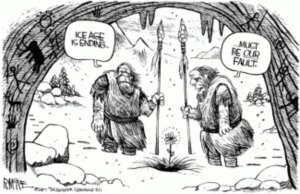Why Do We Ignore Critical Warnings About Climate and Civilization?

The lessons of history can often guide us, yet we seldom heed them.
It’s a perplexing phenomenon in today’s society: the messages meant to warn us of impending crises often fall on deaf ears. You may have encountered credible voices cautioning against the dangers of climate change—not the commonly discussed global warming, but an alarming shift towards a cooling world. Surprisingly, many are resistant to this idea, even as we see stark evidence of energy shortages and increased hardship due to an unexpectedly cold climate.
Just recently, British gas companies announced a fuel crisis, declaring they are running low due to the severe weather. These are not baseless claims; they echo warning signs that have been overlooked for far too long. As members of the Extreme Investor Network, we understand how crucial it is to not only recognize these patterns but to learn from historical data that provides context to our present-day challenges.
The Real Climate Change Dilemma
Why do such critical warnings get dismissed? Observations remind us of an intriguing social experiment conducted by Stanley Milgram, where mere passersby would stop and stare upward, prompting others to join in, all for an event that didn’t exist. The parallel is striking. Just as with climate discussions, many people "look up" to prevailing narratives without questioning the validity of the claims being made.
At Extreme Investor Network, we believe that skepticism, backed by historical insight, can lead to wiser decisions. Throughout history, societies have flourished during warm periods and faced decline during colder, harsher climates. Ancient civilizations like Rome faced their ultimate downfall largely due to societal mismanagement during cooling cycles. The irony is palpable; those who dismiss warnings about climate cycles are often the same ones who ignore vital historical lessons.
The Consequences of Ignoring History
In light of these critical insights, we face a pivotal moment in our civilization. The reduction in energy supply exacerbated by adverse climate conditions could lead to not just economic turmoil but potential conflicts. As we navigate through these challenges, we must grasp the implications they hold for our future.
Societal governance, particularly in regions that seem to ignore historical patterns, poses severe risks. Climate policy debates often hinge more on political ideologies than on scientific data. These misguided policies could spark civil unrest, reminiscent of past upheavals in other regions.
While it can be frustrating to see history repeat itself in the absence of lessons learned, the Extreme Investor Network seeks not to wallow in despair. Instead, we aim to guide our readership towards actionable insights. A proper understanding of these cycles allows us to strategize and prepare effectively for the upcoming challenges, ensuring we are not simply passive observers but active participants in shaping sustainable futures.
Moving Forward with Awareness
It’s important to recognize that while we may not have the power to prevent every disaster, we can arm ourselves with knowledge and foresight. Understanding historical cycles of civilization’s rise and fall doesn’t just prepare us for adversity; it enables us to thrive in a climate of uncertainty.
As we approach pivotal moments beyond 2032, like the decline of Rome, let us strive for meaningful dialogues that honor the lessons of history. We must look beyond forecasts and popular opinions, diving deep into what our past can teach us about today—and ensuring that we are not swept up in the currents of misguided beliefs.
Join us at Extreme Investor Network as we continue to analyze these intricate patterns and foster discussions grounded in reality and history. Together, we can pave a path towards resilience and informed action amidst the noise.

